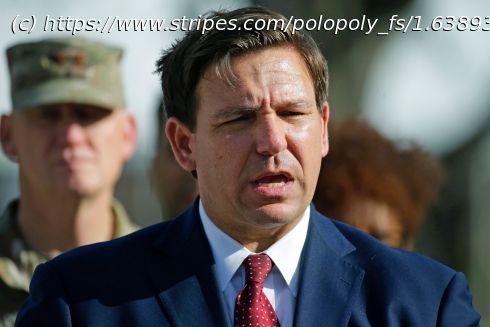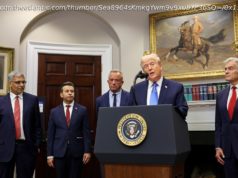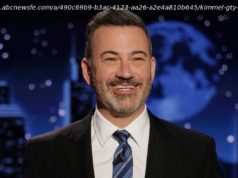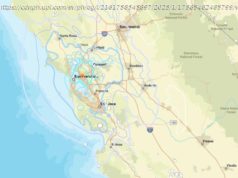As the virus spread out of control in Florida, decision-making became increasingly shaped by politics and divorced from scientific evidence, according to interviews with 64 current and former state and administration officials, health administrators, epidemiologists, political operatives and hospital executives.
Stars and Stripes is making stories on the coronavirus pandemic available free of charge. See other free reports here. Sign up for our daily coronavirus newsletter here. Please support our journalism with a subscription.
ST. PETERSBURG, Fla. — As Florida became a global epicenter of the coronavirus, Gov. Ron DeSantis held one meeting this month with his top public health official, Scott Rivkees, according to the governor’s schedule. His health department has sidelined scientists, halting briefings last month with disease specialists and telling the experts there were not sufficient personnel from the state to continue participating.
“I never received information about what happened with my ideas or results,” said Thomas Hladish, a University of Florida research scientist whose regular calls with the health department ended June 29. “But I did hear the governor say the models were wrong about everything.”
DeSantis, a Republican, traveled this month to Miami to hold a roundtable with South Florida mayors, whose region had emerged as a novel coronavirus hot spot. But the Republican mayor of Hialeah was shut out, weeks after saying the governor “hasn’t done much” for a city affected disproportionately by the virus.
As the virus spread out of control in Florida, decision-making became increasingly shaped by politics and divorced from scientific evidence, according to interviews with 64 current and former state and administration officials, health administrators, epidemiologists, political operatives and hospital executives. The crisis in Florida, those observers sid, has revealed the shortcomings of a response built on shifting metrics, influenced by a small group of advisers and tethered at every stage to the Trump administration, which has no unified plan for addressing the national health emergency but has pushed for states to reopen.
DeSantis relies primarily on the advice of his wife, Casey, a former television reporter and host, and his chief of staff, Shane Strum, a former hospital executive, according to multiple Republican political operatives, including a former member of his administration.
“It’s a universe of three — Shane and Casey,” said one Republican consultant close to DeSantis’ team who spoke on the condition of anonymity to offer a candid assessment.
The response — which DeSantis boasted weeks ago was among the best in the nation — has quickly sunk Florida into a deadly morass. Nearly 5,800 Floridians have died of COVID-19, the disease caused by the virus — more deaths than were suffered in combat by Americans in Afghanistan and Iraq since 2001. One out of every 52 Floridians has been infected with the virus. The state’s intensive care units are being pushed to the brink, with some exceeding capacity. Florida’s unemployment system is overwhelmed and its tourism industry is in shambles.
DeSantis began the year as a popular governor, well-positioned to help close ally President Donald Trump win this crucial state in November’s election. DeSantis is now suffering from sagging approval ratings. Trump has fallen behind Democrat Joe Biden in recent polls of Florida voters. And both men, after weeks of pushing for a splashy Republican convention in Jacksonville, succumbed to the reality of the public health risks Thursday when Trump called off the event.
Trump asked DeSantis in a phone call in May whether he would require masks for the convention and whether the virus would be a problem, according to a person with knowledge of the conversation. DeSantis said he would not require masks and the virus would not be a major problem in August in Florida.
“You were elected to be the governor of our state and make decisions about what is best for us in Florida,” Hialeah Mayor Carlos Hernández said of DeSantis. “If he was more concerned with what the president thought of him, the outcomes are here.”
DeSantis’ office did not respond to interview requests or to a set of detailed questions sent by The Washington Post. In response to questions, a spokesman for the health department said the governor and Rivkees, the surgeon general, “are continuing to remind all Floridians to protect the vulnerable by avoiding the Three Cs: Closed Spaces, Crowded Places and Close-Contact Settings and by wearing a mask in public.”
The spokesman, Alberto Moscoso, did not explain why the department had ended its work with the university modeling team nor why Rivkees appears only once this month on the governor’s schedules, which have been released through July 23.
During the same period, DeSantis spoke regularly to members of the Trump administration. He appeared twice on Fox News and called in to Rush Limbaugh’s radio show.
“Ron DeSantis is doing a great job and will go down in history as a great governor of Florida,” the president told The Washington Post through a spokeswoman.
Those who defend the governor’s approach point to his early efforts to protect nursing homes. They also dispute claims that he has been inflexible, emphasizing his decision to re-close bars and clubs last month after a spike in infections. The governor’s allies also have commended him for securing more remdesivir, an antiviral drug used to treat the most severe coronavirus patients, which is in short supply across the country.
Rep. Matt Gaetz, R-Fla., said the governor’s relationships in Washington have benefited Florida. In the spring, the state emerged on top “in terms of supplies and resources,” because, in the telling of Trump, “we’re really good at asking for stuff,” Gaetz said.
Jared Moskowitz, a former Democratic state legislator who now heads the Florida Department of Emergency Management, said DeSantis has been “completely accessible” and “open-minded in our conversations.”
He continued, “Anything that I have needed or asked for, dollars that are going to be required to respond appropriately have always been available.”
The department’s command center was temporarily shuttered this month after a series of infections among staff working there.
Some of Florida’s woes are shared by other states, especially in the Sun Belt: economies powered by tourism and hospitality whose leaders sought reasons to invite people back to their states, skeletal public health systems that could not adequately respond with contact tracing and other interventions, and holiday celebrations that caused residents, particularly young people, to flout guidelines.
Home
United States
USA — Science Coronavirus ravaged Florida as Ron DeSantis sidelined scientists and followed Trump






